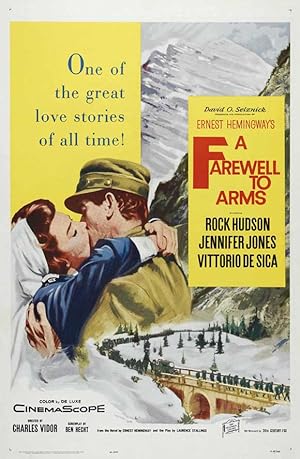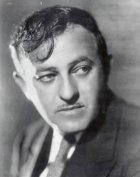
A Farewell to Arms
- APPROVED
- Year:
- 1957
- 152 min
- 1,046 Views
When I came back from leave,
everything looked the same...
...except the countryside
was already green.
I saw the old church in a cup
in the hills...
...and the mountains beyond, brown
mountains with green on their slopes.
The war slowed down
during the winter...
...but the troops still marched
with heavy cartridge boxes...
...bulging under their capes...
...as though they were
six months gone with child.
Our unit was stationed in the town
where we had been since autumn.
I was glad the Austrians
seemed to want to come back.
They did not bombard it
to destroy it...
...but only a little, in a military way.
Lieutenant!
Frederico! We miss you.
- Hi, Bonello.
- Look who's back. Signore lieutenant.
- Car's in good shape? How's this one?
- It's okay.
- Okay, number one.
- Having any trouble with the war?
No. Here in Orsino, the ambulance
company has no trouble with the war.
But up there, the war is bad.
Always bad.
I know how you feel.
Give me my hat
to go play with the girls.
Show me the girls and I go play.
I see nothing's changed.
How are you, Passini?
And you, Aymo.
Still causing trouble?
I, signore lieutenant? It is Passini
who keeps moaning.
You know what he told me
about you yesterday? He said:
"The lieutenant,
he don't come back."
He's wrong. I said
you don't come back...
...because Americans,
they're too smart.
Not all of them, maybe.
Think I'll check in.
Looks like you get along
better without me.
It's better to have an officer
to complain about.
Here, take these things
in signore lieutenant's quarters.
Come in.
Lieutenant Henry
reporting for duty, sir.
You'll never learn. It's not like this.
Like this.
You're back in good time.
We expect to get a road
through the snow in a few weeks.
Then we move.
Glad you're back, lieutenant.
Thank you, Major Stampi.
Your chess has improved, doctor.
God must have heard
my prayers for you.
Check.
What do you say, Father, if after
you die you find out there is no God?
I shall keep the bad news
to myself, major.
The papi returns.
Did you have a nice permission?
You're looking well.
Lying is a sin, Father.
Lieutenant Henry looks terrible.
One more kiss and he'd fall apart.
What's new? I hear from Major Stampi
we're almost ready to go.
Yes. Soon we march up the Alps,
down the Alps...
...capture Austria and finish the war.
By God's mercy.
A stubborn fellow.
Two years in war...
...and he still pretends
there is a God of mercy. Coffee?
- No, thanks.
- Did you see much of interest?
- Well, I saw some fine churches.
- From the outside, I hope.
Perhaps someday when you have
the time, you'll enter one.
God is patient.
Tell me, did you go fishing in Abruzzi?
And did you see my family?
I'm sorry, Father.
I meant to go to the Abruzzi...
...but things came up in Naples and...
We'll go together someday.
Perhaps Rini will go with us.
Yes. Unbelievers are sometimes
devout fishermen.
- How are things at the hospital?
- Since you went away, nothing.
Jaundice, pneumonia,
self-inflicted wounds.
And of course, venereal diseases.
Always harder
to evade than enemy bullets.
But tell me, I can wait no longer.
What kind of a time did you have?
- Great.
- Many beautiful girls?
- Enough.
- At your age, I never spoke that word.
I think perhaps we should finish
our game tomorrow, major.
You are a good priest, but still a priest.
- I shall be happy to beat you tomorrow.
- See you tomorrow.
- Frederico.
- So long, Father.
Now, where did you go
and what did you do?
- Tell me everything at once.
- I went everywhere.
Milan, Florence, Rome,
Naples, Taormina.
You talk like a timetable. Where was
the most beautiful adventure?
- Milan.
- Maybe because it was first.
She played the piano beautifully.
There is nothing like talent.
a lady artist, a contortionist...
Oh, shut up.
I bore my friend, forgive me.
However, I have something of interest.
Here we have a big improvement
in the war situation.
- We have beautiful English girls.
- Wonderful.
Yes, the British have opened
a new hospital near Orsino.
I am now in love with one
of the nurses, Miss Barkley.
I have even thought
of marrying Miss Barkley...
...but I best confess,
she has one drawback:
Her attitude is uncooperative.
You must be slipping.
No, but she is very strange,
very moody.
Who knows, she might even
prefer you to me.
You will meet her tomorrow.
Have you any money?
- Fifty lire?
- In my wallet.
I must make the impression
of a man of sufficient wealth.
You are my great and good friend,
and financial protector.
- Don't overdo it.
- In case I change my mind...
...I will need this for the Villa Rosa.
Poor girls, they have missed me.
- You and 50 lire.
- And you...
Carmelina told me, "If Frederico
does not come back soon...
...we hang the Villa Rosa
in black bunting."
Oh, shut up about dames.
I can see you had
a successful vacation.
Two new ones.
England is a great country.
- Good morning.
- Good morning.
I would like...
Excuse me.
- Miss Barkley? Good morning.
- Good morning, major.
May I present my young American
friend, Lieutenant Frederick Henry.
How do you do?
Hello.
Isn't it odd for an American
to be in the Italian army?
It's not the army, only the ambulance.
- The ambulance is important service...
- It's very odd, though.
Why did you do it?
Oh, I missed out on a job
as war correspondent.
I didn't want to kill anybody, so I
tried the Red Cross, to have a look.
- To have a look?
- Yes, I may want to do some writing.
They assigned me
to the auto ambulance.
- End of story.
- With me, it's a different story.
I am a lover of mankind...
- Major Rinaldi?
- Yes.
Dr. Gates would like to see you,
if you have time.
Yes, I have time. Will you pardon me?
Will you follow me please, doctor?
With pleasure.
What's the stick?
It belonged to a boy
who was killed last year.
Oh, I'm sorry. I...
He was a very nice boy.
He was going to marry me.
- He was killed in the Somme.
- That was a mean battle.
His mother sent me the little stick.
They returned it with his things.
- Were you engaged long?
- Eight years.
- We grew up together.
- Why didn't you marry him?
I don't know. I was a fool not to.
Have you ever loved anyone?
Off and on.
You have beautiful hair.
I was going to cut it all off
when he died.
That would've been a shame.
I wanted to do something for him.
He could've had anything
he wanted if I had known.
I would have married him, or anything.
I thought it would be worse for him
to go to war if we were lovers.
Then, of course, he was killed.
That was the end of it.
I don't know.
Oh, yes. That's the end of it.
It's very beautiful here.
- Is it true they'll have an offensive?
- So I've heard.
Then we'll have some work.
There's no work now.
- Done nursing long?
- Since the end of ' 15.
I started when he did.
I remember having a silly idea he might
Translation
Translate and read this script in other languages:
Select another language:
- - Select -
- 简体中文 (Chinese - Simplified)
- 繁體中文 (Chinese - Traditional)
- Español (Spanish)
- Esperanto (Esperanto)
- 日本語 (Japanese)
- Português (Portuguese)
- Deutsch (German)
- العربية (Arabic)
- Français (French)
- Русский (Russian)
- ಕನ್ನಡ (Kannada)
- 한국어 (Korean)
- עברית (Hebrew)
- Gaeilge (Irish)
- Українська (Ukrainian)
- اردو (Urdu)
- Magyar (Hungarian)
- मानक हिन्दी (Hindi)
- Indonesia (Indonesian)
- Italiano (Italian)
- தமிழ் (Tamil)
- Türkçe (Turkish)
- తెలుగు (Telugu)
- ภาษาไทย (Thai)
- Tiếng Việt (Vietnamese)
- Čeština (Czech)
- Polski (Polish)
- Bahasa Indonesia (Indonesian)
- Românește (Romanian)
- Nederlands (Dutch)
- Ελληνικά (Greek)
- Latinum (Latin)
- Svenska (Swedish)
- Dansk (Danish)
- Suomi (Finnish)
- فارسی (Persian)
- ייִדיש (Yiddish)
- հայերեն (Armenian)
- Norsk (Norwegian)
- English (English)
Citation
Use the citation below to add this screenplay to your bibliography:
Style:MLAChicagoAPA
"A Farewell to Arms" Scripts.com. STANDS4 LLC, 2025. Web. 6 Mar. 2025. <https://www.scripts.com/script/a_farewell_to_arms_8018>.







Discuss this script with the community:
Report Comment
We're doing our best to make sure our content is useful, accurate and safe.
If by any chance you spot an inappropriate comment while navigating through our website please use this form to let us know, and we'll take care of it shortly.
Attachment
You need to be logged in to favorite.
Log In